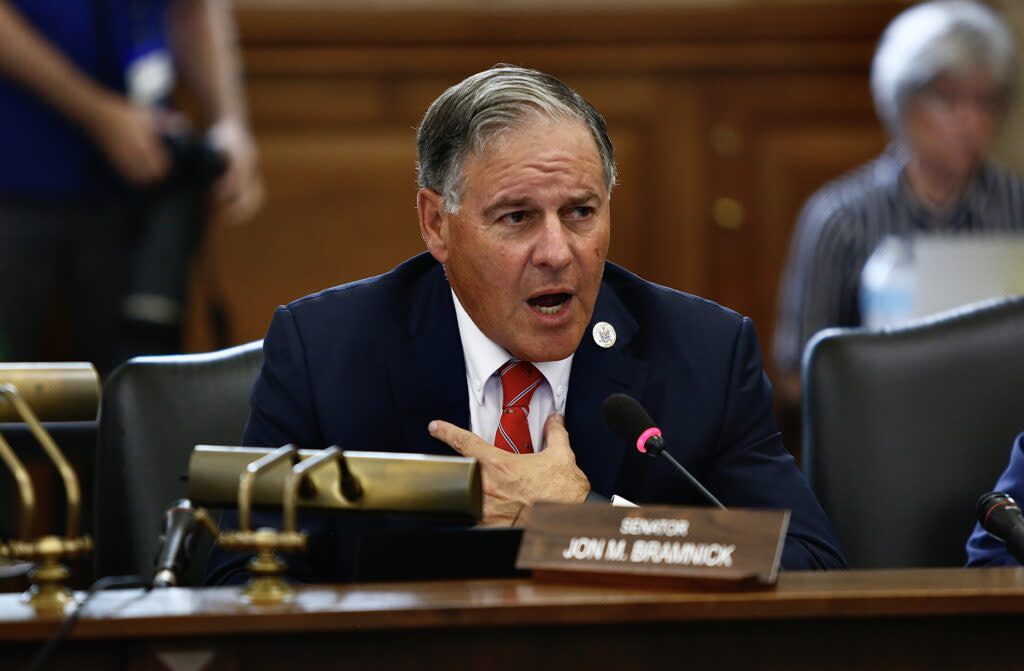After snafu cost Sen. Bramnick’s campaign $36K, senator seeks change in law on cash transfers

Sen. Jon Bramnick's 2023 campaign lost $36,000 when money intended for a vendor was accidentally sent to the wrong person. Now he wants to make it illegal to keep money you were sent mistakenly. (Dana DiFilippo | New Jersey Monitor)
All it takes is one wrong digit to send money to the wrong person via Venmo or a wire transfer. Just ask Sen. Jon Bramnick.
During the Union County Republican’s campaign for state Senate in 2023, his treasurer intended to send money to a vendor, but because the intended recipient’s account number was input incorrectly, the cash landed in the account of someone in Florida, to the tune of $36,589.
That person made a video of them showing off the tens of thousands in cash they received mistakenly, clinking bundles of bills as if they were champagne glasses, according to footage seen by the New Jersey Monitor.
The experience pushed Bramnick, who is seeking the GOP nomination for governor next year, to add his name as the co-sponsor of a bill that would make it illegal to keep erroneous payments like these, and other money transfers sent through apps like Venmo and CashApp, if the receiver knows it was sent in error.
“If money goes to an account and the person knows it’s not their money and is told it’s not their money … the question is, you’re keeping funds you know and should’ve known is someone else’s money,” said Bramnick.
Under the legislation, someone mistakenly sent cash would have 30 days to return the funds after being contacted by the sender. If they refuse, they would face theft charges.
Sen. John McKeon (D-Essex) introduced the bill after hearing about a West Orange case where someone mistakenly sent the wrong person money. Police told McKeon there was no way to resolve the problem under current law.
Making the problem especially difficult, McKeon said, is that $50 sent mistakenly to the wrong person on Venmo is considered an authorized transaction, which makes it hard to dispute with a bank, as opposed to a fraudulent credit card charge.
He said the bill would help modernize state statute to account for 21st-century methods of sending people money.
“It’s a great system. People use it all the time. But at the same time, you can easily make a mistake,” he noted.
According to Venmo’s policies, it’s not possible to cancel or reverse a payment. Zelle and CashApp offer similar warnings.
The bill advanced unanimously out of the Senate Commerce Committee last week. It cleared an Assembly committee in February and faces another hearing in that chamber’s judiciary committee.
The bill’s language doesn’t lay out penalties for someone who refuses to return money they were sent in error. McKeon said his office is working on whether they should be added to the bill, noting that theft penalties change depending on the amount of money involved. The intent of the bill isn’t to punish people, but to motivate them to return money they shouldn’t have received, he said.
McKeon’s legislation is not without its critics. Joseph Steinberg, a cybersecurity and AI expert, said it raises questions about jurisdiction, the potential for abuse, scams, and the definition of accident. The bill would essentially create a “government-mandated return policy,” he said.
“It becomes an example of the devil is in the details, right? What’s the process for determining that something was actually an error? Who has to prove that it was an error? How does one prove that was an error?” he asked.
Venmo warns its users about common scams, like a fraudster impersonating a friend and asking for money for an emergency. Steinberg said the bill “opens the door to be exploited by criminals.”
Steinberg added that the bill does not address the complexities of interstate commerce. He wondered how the law would apply if a New Jersey resident sent money to someone in California, or if the resident was traveling in Delaware and sent it to someone in Virginia. Adding in the involvement of banks with locations in other states and it’s a “jurisdiction nightmare,” he said.
In the case of Bramnick’s missing cash, his campaign first called the Scotch Plains police, who then referred it to Florida authorities. The law in Florida doesn’t cover people retaining money wired erroneously, Bramnick said, so he was left to deal with it in New Jersey Superior Court, where his campaign is suing Valley National Bank — which handled the initial transfer — and JPMorgan Chase, the bank of the person who ended up with the Bramnick campaign’s money.
On June 12, 2023, Valley initiated the transfer of the funds, which were intended to go to Flexpoint Media. Nine days later, Bramnick’s campaign treasurer told the bank the vendor never received the money, then discovered the wrong account number had been input, the senator’s attorneys said. Bramnick’s filings also claim that Valley sent a message to Chase in an attempt to recall the mistaken wire transfer, and Valley employees told the Bramnick campaign the money would be returned.
The money sat in a Chase account for a week before it was withdrawn by the Florida account holders, Bramnick’s campaign alleges, despite his treasurer demanding the money be returned. Chase refused to disclose the identity of the recipients and told Bramnick it has no duty to verify inconsistencies, his attorneys said in a complaint.
The day the money was withdrawn, June 28, the mistaken beneficiaries posted videos and photos of them holding $36,000 in cash on social media, according to Bramnick’s complaint.
After fighting with the banks for months, his senate campaign sued the banks for negligence and refusing to reimburse the funds.
Chase claims it was compliant with the law by accepting the wire transfer, as it was not aware of any discrepancies, and blames the account number error on Bramnick’s campaign.
Court documents show a judge is expected to decide next month on JPMorgan Chase’s motion to dismiss the case. Bramnick told the New Jersey Monitor the case is being settled and he’s recouping the money, though not from the couple who unintentionally received it. He said the whole matter is “not as uncommon as you might think,” which his why he joined with McKeon to update state law on this issue.
“This is quite a good change, especially for those lucky people who got my money,” he said.
Attorneys for Valley National Bank and JPMorgan Chase did not respond to requests for comment.
Nikita Biryukov contributed to this report.
The post After snafu cost Sen. Bramnick’s campaign $36K, senator seeks change in law on cash transfers appeared first on New Jersey Monitor.


